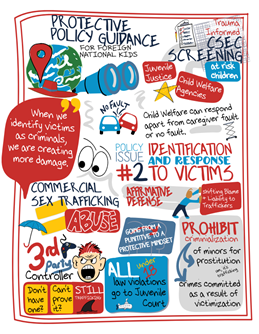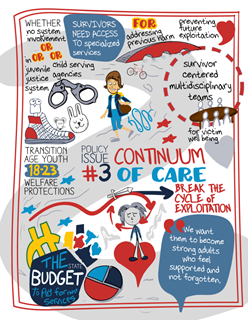Shared Hope has been a leader on policy research in the field of child and youth sex trafficking for over 20 years, working to ensure federal, state, and local policies are rooted in and supported by research and promising practices. Shared Hope’s Policy Team provides technical assistance and advocacy support to Congressional and state legislators seeking research-based, survivor-centered, and field-informed policy solutions to address child and youth sex trafficking. As Congress heads into Summer Recess and 27 of the 46 states in session in 2022 have adjourned for the calendar year, Shared Hope is doing a legislative update blog series on state and federal laws that have been introduced and enacted with the potential to impact survivors of child and youth sex trafficking. [Read more…]
Updated 2/21/2025
It is commonly known that unjust criminalization can be retraumatizing and creates an uneasy relationship between the survivor and the legal justice system. However, many state and federal laws continue to charge victims of human trafficking with the crimes they committed under coercive force by their traffickers. These crimes are frequently prostitution offenses but may also include misdemeanors and felonies ranging from theft to more serious violations. The victim often commits these crimes to appease their trafficker or survive their situation. These “victim–offenders,” or survivors who find themselves in the intersection of victimization and criminal offender, are retraumatized by their detention and prosecution. They are also left with a criminal record that hinders their enrollment in higher education, limits their ability to purchase a home, and restricts their access to work opportunities. The inability to develop their lives may leave survivors feeling stuck, financially restricted, and with no way to excel except by returning to their trafficker. Although some states have taken action to address this by allowing trafficking victims to vacate unjust convictions, Congress has yet to take similar action on this issue.
To address this issue and provide enduring support for trafficking victims, Shared Hope International supports introducing the Trafficking Survivors Relief Act (TSRA). The TSRA seeks to amend Title 18 of the U.S. Criminal Code. The amendment permits vacatur, or complete removal from an individual’s record, for non-violent criminal offenses when the offense was directly related to having been a victim of trafficking. See C(I). TSRA also provides victims with confidentiality by filing any document relating to the motion to vacate under seal and withholding any identifying information from public inspection.
Finally, the TSRA further amends Title 18 by adding a human trafficking defense. This defense establishes a rebuttable presumption that the offense was induced by duress, force, or coercion, wherever any defendant establishes by clear and convincing evidence, that they were a victim of trafficking at the time of the committed offense.
The Trafficking Survivors Relief Act accomplishes these goals by:
- Amending Title 18 to allow a rebuttable presumption that certain offenses committed by victims of human trafficking were induced by coercion.
- Amending Title 18 to permit a motion to vacate or expunge criminal offenses based on the mitigating factor that the alleged conduct that resulted in the arrest was directly related to the movant having been a victim of trafficking.
- Sealing any identifying record or part of the proceeding related to such motion from the public record.
Current Sponsors:
House: Russell Fry, Ted Lieu, Ann Wagner, Robert Garcia, Hank Johnson, Debbie Dingell, Ami Bera, Andy Biggs, Greg Landsman, Michael Lawler, Emilia Strong Sykes, Byron Donalds
Learn More & Cosponsor:
- Visit https://sharedhope.org/what-we-do/bring-justice/ to access Shared Hope’s research and advocacy resources.
- TSRA Myths vs Facts
- TSRA Fact Sheet
- For technical assistance, contact our Policy team at Policy@sharedhope.org
Additional Sources:
- Trauma, Coercion, And the Tools of Trafficking Exploitation: Examining The Consequences for Children And Youth In The Justice System, 109 Ky. LJ. 719. https://sharedhope.org/wp-content/uploads/2021/12/TRAUMA-COERCION-AND-THE-TOOLS-OF-TRAFFICKING-EXPLOITATION-EXAMINING-THE-CONSEQUENCES-FOR-CHILDREN-AN.pdf .
- Responding to Sex Trafficking Victim – Offender Intersectionality: A Guide for Criminal Justice Stakeholders, https://sharedhope.org/wp-content/uploads/2020/01/SH_Responding-to-Sex-Trafficking-Victim-Offender-Intersectionality2020_FINAL.pdf.

 Issue area #3, Continuum of Care, addresses the need of more services for victims of child and youth sex trafficking and vulnerable populations.
Issue area #3, Continuum of Care, addresses the need of more services for victims of child and youth sex trafficking and vulnerable populations.





